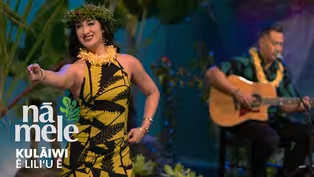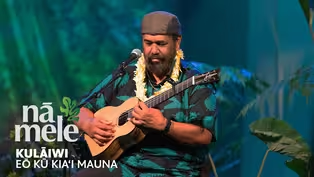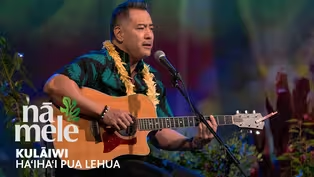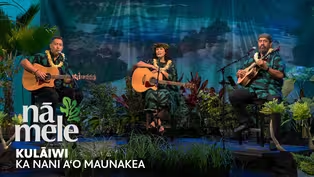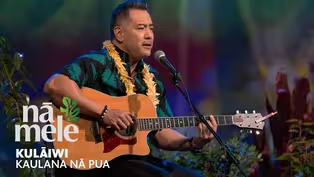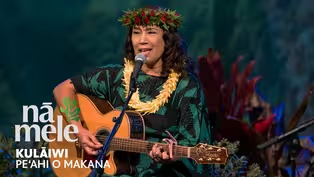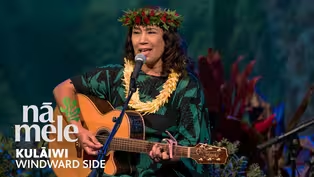
Ku‘u Pili
Clip: Special | 6m 15sVideo has Closed Captions
Kulāiwi
For Lehua Kalima Alvarez of Na Leo Pilimehana, Kawika Kahiapo and Shawn Kekoa Pimental, the idea to team up and form the group Kulāiwi started in 2018, but the pandemic complicated things.
Problems playing video? | Closed Captioning Feedback
Problems playing video? | Closed Captioning Feedback
Nā Mele is a local public television program presented by PBS Hawai'i

Ku‘u Pili
Clip: Special | 6m 15sVideo has Closed Captions
For Lehua Kalima Alvarez of Na Leo Pilimehana, Kawika Kahiapo and Shawn Kekoa Pimental, the idea to team up and form the group Kulāiwi started in 2018, but the pandemic complicated things.
Problems playing video? | Closed Captioning Feedback
How to Watch Nā Mele
Nā Mele is available to stream on pbs.org and the free PBS App, available on iPhone, Apple TV, Android TV, Android smartphones, Amazon Fire TV, Amazon Fire Tablet, Roku, Samsung Smart TV, and Vizio.
Lehua Kalima Alvarez: I think the, the history that we all have.
The 100 plus years, if you put us all together of music that we've, we've shared.
It just, yeah, the maturity of it.
You know, everybody knows what they supposed to do.
And we do it and we do it with joy.
And we do it with purpose.
And you know, and we do it because we love it.
And not because we have to.
Shawn Kekoa Pimental: And it really is us, raw.
You know, in our raw elements.
Like all our songs, everything that we say on stage, everything that we sing, everything that we dance, that we say in interviews, it really is us, you know, it's not rehearsed.
We live our culture, we live our ʻōlelo, we live our hula, we live our music, you know, and we really want to continue to inspire others to do that as well.
Pono Fernandez: I feel like music is almost like a map.
You can map your memories onto music, you hear a song and it takes you someplace you hear a song and you have this memory of a person or someplace that you've been.
And it's the same thing with our culture, mele are maps of our culture.
And if we don't write new music today, then our children's, children's, children, seven generations down the road, they're not going to know what our experience was.
And so, you know, we're really stepping into our kuleana here, as storytellers through our music through our hula through our moʻolelo so that there will always be aloha aina generations to come.
Kawika Kahiapo: And I think this is just the beginning.
So we feel like there's more kuleana for us to stay focused and stay busy, inspiring, and writing and being a voice in sharing it with our lāhui and Hawaiians, non-Hawaiians and visitors alike.
They're grasping onto the music, they're loving it and we have work cut out for us.
Performance Ku‘u Pili (Guitar instrumental) ‘Auhea wale ‘oe E ku‘u ipo nohea He pua o ka makani Kaiāulu E hō‘olu mai I ku‘u nui kino ē He aloha pili hemo ‘ole Eō mai, e ku‘u pili e Ku‘u hoa ke‘ālani Eō mai, e ku‘u pili e Aia i ka malu O ku‘u aloha nui e Ku‘u hoa alo pali Onaona i ka i‘u Māpu mai ke ‘ala anuhea E kāhiko mai I ku‘u alo e He aloha pili hemo ‘ole Eō mai, e ku‘u pili e Ku‘u hoa ke‘ālani Eō mai, e ku‘u pili e Aia i ka malu O ku‘u aloha nui e Eō mai, e ku‘u pili e Aia i ka malu O ku‘u aloha nui e Aia i ka malu O ku‘u aloha ē Oooh, oooh (Guitar strums)
Providing Support for PBS.org
Learn Moreabout PBS online sponsorshipSupport for PBS provided by:
Nā Mele is a local public television program presented by PBS Hawai'i
